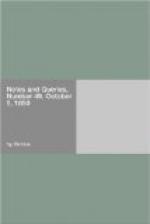MR. SINGER will see at once that my interpretation (which I consider quite consistent with the character of Shakspeare’s mind, as well as quite consistent with the expressions he has used throughout the speech of the hero), steers clear of his proposal to alter “busie lest,” or “busie least,” of the folios of 1623 and 1632, to busyest or busiest; although everybody at all acquainted with our old language will agree with him in thinking, that if Shakspeare had used “busiest” at all, which he does not in any of his productions, he might have said most busiest without a violation of the constant practice of his day.
J. PAYNE COLLIER.
September 24. 1850.
* * * * *
GRAY’S ELEGY.
Perhaps the HERMIT of HOLYPORT will be satisfied with proofs from GRAY himself as to the time and manner of the first appearance of the Elegy.
GRAY thus writes to Dr. Wharton, under the date of “Dec. 17, 1750.” [I quote Mason’s “Life” of its Author, p. 216.]
“The stanzas” [which he afterwards called Elegy at the suggestion of Mason] “which I now enclose to you have had the misfortune, by Mr. [Horace] Walpole’s fault, to be made still more public,” &c.
The next letter in Mason’s publication is a letter from “Mr. Gray to Mr. Walpole” (p. 217.), and is dated “Cambridge, Feb. 11, 1751,” which runs thus:—
“As you have brought me into a little sort of distress, you must assist me, I believe, to get out of it as well as I can. Yesterday I had the misfortune of receiving a letter from certain gentlemen (as their bookseller expresses it) who have taken the Magazine of Magazines into their hands: they tell me that an {301} ingenious poem, called ’Reflections in a Country Church-yard,’ has been communicated to them, which they are printing forthwith; that they are informed that the excellent author of it is I by name, and that they beg not only his indulgence, but the honour of his correspondence, &c.... I therefore am obliged to desire you would make Dodsley print it immediately from your copy, but without my name, &c. He must correct the press himself ... and the title must be ’Elegy written in a Country Church-yard.’ If he would add a line or two to say it came into his hand by accident, I should like it better ... If Dodsley do not do this immediately, he may as well let it alone.”
Dr. Johnson (Life of Gray) says:
“His next production, 1750, was his far-famed Elegy,” &c.
The Doctor adds:




